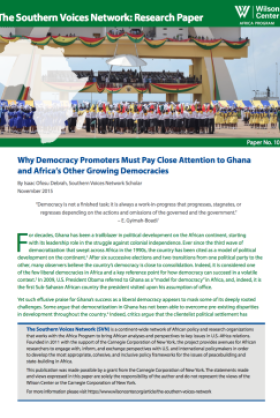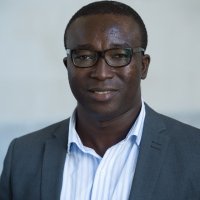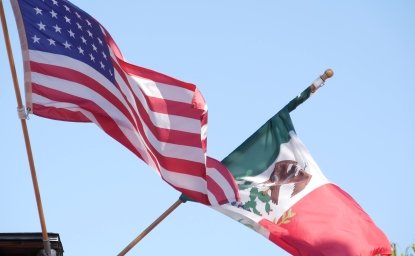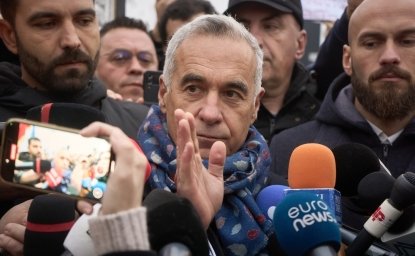Why Democracy Promoters Must Pay Close Attention to Ghana and Africa’s Other Growing Democracies


For an in-depth analysis, see the 8-page Southern Voices Network Research Paper no. 10 "Why Democracy Promoters Must Pay Close Attention to Ghana and Africa’s Other Growing Democracies" (PDF).
Ghana is one of Africa’s most stable democracies. After six successive elections and two transitions from one political party to the other, many observers believe the country’s democracy is close to democratic consolidation, having met the two-turnover test suggested by Huntington (1991).1 Yet such effusive praise for Ghana’s success appears to mask some of its deeply rooted challenges. Although significant progress has been made in the intrinsic aspects of democracy (e.g. rule of law; relatively free, fair, and competitive elections; civil liberties), this has not yet been matched by a corresponding improvement in the instrumental aspects (e.g. the provision of public goods). This has been compounded by a slow-down in economic growth from 14.2% in 2011 to 4.2% in 2014.2 Even more worrying is the fact that public opinion data suggest a decline over time in citizen satisfaction with democracy.3 At the same time, there is a significant lack of trust in institutions. African countries and the international community should be concerned about these trends given Ghana’s role as a stable partner in the particularly volatile region of West Africa.
Policy Options and Recommendations
1. For the International Community
a. Link democracy assistance to economic programs: The United States and other key donors must link democracy assistance to economic programs that deliver socioeconomic goods, a key pidend of democracy. Given the considerable success in consolidating the intrinsic aspects of democracy, paying considerable attention to the delivery of public goods, job creation, and improvement in living conditions is crucial. Ghana remains well short of solidifying the foundations of macroeconomic fundamentals necessary for sustained growth and prosperity. Tying democracy assistance to improvement in economic conditions can help create a significant shift by African politicians from rhetoric to the actual delivery of socially inclusive development programs. If the United States and the other major bilateral and multilateral donors were to move together toward a comprehensive strategy that affirms the close linkage between democracy, good governance, and sound economic management, they would generate powerful new pressures for countries to deliver on development as well as democratic freedoms. Programs such as the United States’ Millennium Challenge Corporation (MCC) may be addressing this; nonetheless, the selection criteria must remain stringent to send a clear message to non-performing countries that there is no way to qualify from an MCC compact if they do not fulfill all the criteria.
b. Reinvigorate democracy promotion: The United States and other key donors must reinvigorate democracy promotion. Commitment to democracy promotion has appeared to ebb with the global financial crisis and the justifiable cause of fighting global terrorism. The danger is that by the time the fight against terrorism recedes, the United States and its allies may have another fight in dealing with the reversal or stagnation of democratic gains. Vice President Joe Biden’s pledge that the United States will continue to support regions of the world where democracy is threatened is critical.4 The projected increase in direct support for democracy, human rights, and governance from $1.92 billion in 2015 to $2.85 in 2016 by the United States is a welcome development.5 History has shown that democracy is more likely to lead to economic development in the long run; therefore the United States and the international community must sustain democracy promotion in Africa.
2. For African Governments
a. Improve how the success of democracy is measured: Intrinsic and instrumental aspects of democracy are inextricably linked, so any assessment must focus on both. Yet most democracy indicators are heavily skewed towards the measurement of intrinsic aspects like the rule of law, tolerance of civil society and opposition politics, and peaceful transitions. As much as intrinsic elements are fundamental building blocks for progress, it would be useful to have an assessment tool that measures how well democracy is delivering much-needed jobs, quality education, healthcare, and infrastructure; bridging the gap between the rich and the poor; and strengthening economic institutions to be responsive to citizens’ needs. Ratings on these indicators are likely to push laggards to perform better on international rankings, just as they have done with democracy’s intrinsic elements.
b. Utilize the African Union’s Continental Early Warning System (CEWS): Member countries in the African Union (AU) must honor their financial commitments towards the Continental Early Warning System (CEWS), which is a central component of the Africa Peace and Security Architecture established to gather and analyze data on the likelihood of conflict, as well as to identify opportunities for strengthening peace across the continent.6 So far CEWS is heavily underfunded. A large share of CEWS funding comes from external actors; reports are not released in a timely manner; and more expertise is needed in areas such as data processing and analysis for policymakers. The West is doing its part by supporting these programs, but the AU and its members must also intensify their commitments.
c. Fund capacity building for institutions and civil servants: In countries where democracy is close to consolidation, the next task is strengthening political and economic institutions. Civil servants, especially at the mid-level, are central to this effort. Unlike those in the upper echelons, who are mainly political appointees with terms in office closely linked to the term of the appointing government, mid-level civil servants are likely to remain within the institution longer and are therefore better able to contribute to policy reforms. Yet many mid-level civil servants lack requisite skills and expertise.7 Thus democracy assistance must go in tandem with capacity building for civil servants, who ensure the continuity of institutions.
d. Promote a continent-wide effort: The responsibility to consolidate and improve democracy on the continent should not be left entirely to Western actors. African leaders must more directly confront their peers when they violate democratic norms. The African Peer Review Mechanism, which is supposed to ensure this, is in relative decline due to inadequate political will, financial and logistical challenges, and stalled peer reviews, among other problems. To move the process forward, African leaders must demonstrate that this is not a process for patting each other on the back, but a way to challenge their peers to deliver democracy and healthcare, tackle ever-increasing youth unemployment, and develop Africa’s informal sector where most of the population make their living.
Endnotes
1. Samuel P. Huntington, The Third Wave: Democratization in the Late Twentieth Century (Norman: University of Oklahoma Press, 1991).
2. Michael Bratton and E. Gyimah-Boadi, “Political Risk Facing African Democracies: Evidence from Afrobarometer,” Afrobarometer Working Paper No. 157 (2015). http://afrobarometer.org/sites/default/files/publications/Working%20papers/afropaperno157.pdf
3. Ghana Round 6 Afrobarometer data http://afrobarometer.org/data/ghana-round-6-data-2015
4. Cassie Spodak, “Biden calls on African leaders in fight for democracy, pledges U.S. support,” CNN, August 4, 2014. http://politicalticker.blogs.cnn.com/2014/08/04/biden-calls-on-african-leaders-in-fight-for-democracy-pledges-u-s-support/
5. “Foreign Assistance in Ghana,” ForeignAssistance.Gov, accessed November 15, 2015, available at http://beta.foreignassistance.gov/explore/country/Ghana
6. See African Union’s Continental Early Warning System, available at http://www.peaceau.org/en/page/28-continental-early-warning-system-cews
7. Stephanie Hanson, “Angola’s Political and Economic Development,” Council on Foreign Relations, July 21, 2008. http://www.cfr.org/world/angolas-political-economic-development/p16820
Isaac Ofosu Debrah served as a Southern Voices Network Scholar at the Wilson Center from September to November 2015. He is Assistant Project Manager for Anglophone West Africa at the Ghana Center for Democratic Development (CDD) in Accra, Ghana, which is a member of the Southern Voices Network.
This publication was made possible by a grant from the Carnegie Corporation of New York. The statements made and views expressed in this paper are solely the responsibility of the author and do not represent the views of the Wilson Center or the Carnegie Corporation of New York.
Author


Africa Program
The Africa Program works to address the most critical issues facing Africa and US-Africa relations, build mutually beneficial US-Africa relations, and enhance knowledge and understanding about Africa in the United States. The Program achieves its mission through in-depth research and analyses, public discussion, working groups, and briefings that bring together policymakers, practitioners, and subject matter experts to analyze and offer practical options for tackling key challenges in Africa and in US-Africa relations. Read more

Explore More
Browse Insights & Analysis
The Southern Voices Network for Peacebuilding

Navigating US-Mexico Relations: Opportunities Amid Challenges

